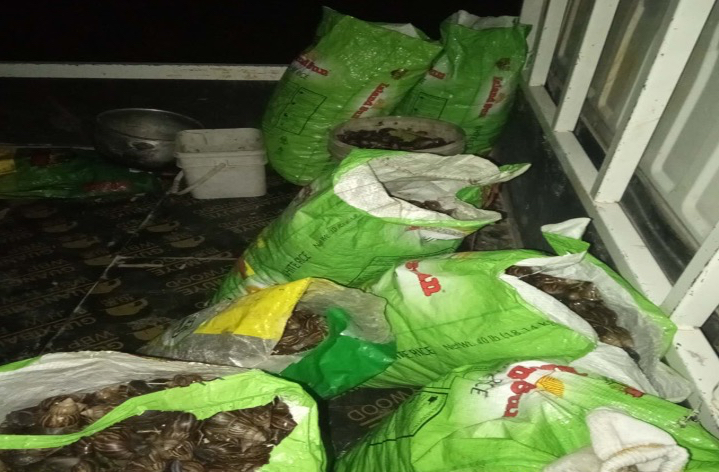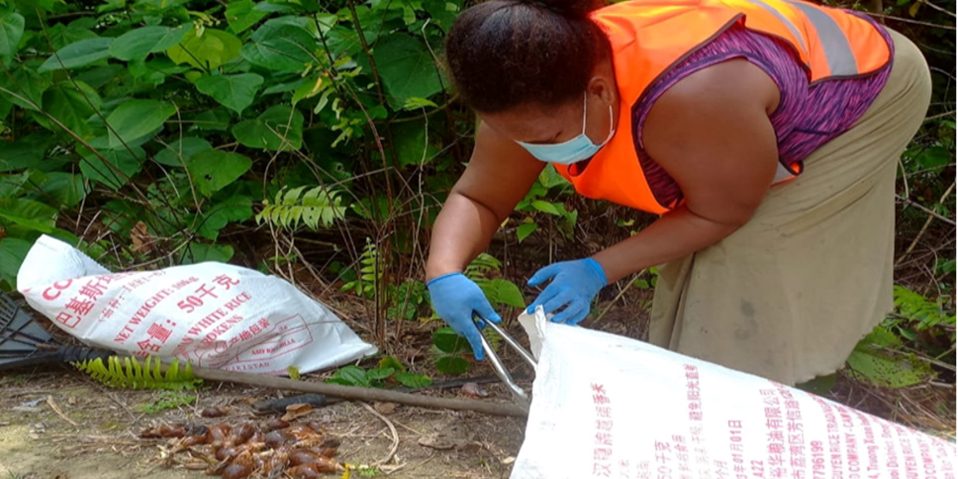NICKEL Enterprise Solomon Islands Ltd [NESI] has stepped in to help the Renbel Provincial Government stop the spread of the invasive Giant African Snail (GAS) in the hope of providing communities there with food security.
NESI is the mining company, which began an extensive bauxite prospecting program on Rennell in recent months. It said it was surprised at the extent and how fast the infestation spread on the island.
“It is not our responsibility to mount an eradication program but we fear that if no one steps in, the potential danger to food crops cannot be ruled out,” a company spokesman told Solomon Star this week.
“So, we dived in only to find a week later the Provincial government is helping Florida Mines – another mining company to compete with us. In situation like this, collective collaboration is what we need, not giving a few bags of rice to villagers. Such an effort is unsustainable in the long run,” the spokesman said.
It is understood the Renbel Provincial Government had chartered a landing barge which distributed foodstuffs and other items to communities in support of Florida Mines.
“Our approach to tackle the spread of the invasive Giant African Snail (GAS) through our GAS program is the most effective. It has the potential to help communities going hungry in the long run,” the spokesman said.
The program began in North Tingoa on Rennell two weeks ago. It is being undertaken under the supervision of the Company’s senior environment officer and Rennell Local Supervisor.
“Getting rid of the GAS is the responsibility of the Provincial Government. They are supposed to be the one to execute the program. NESI has to step in to help affected communities mitigate the infestation and thereby avoid famine in the future,” he said.
Meanwhile NESI’s 16-day Work Plan to get rid of the snail infestation on Rennell is continuing in earnest.
The objective, the Company said, is “to systematically place bait, collect snails, and destroy Giant African Snails to mitigate the infestation.”
To assist in this work, the entire area to be covered has been mapped out. Five field teams are being deployed for the assignment. Among other things, their work in the first two days would involve site inspection to identify infested areas.

In doing so, they will also map out heavily infested zones. Zones with high snail activity would be marked for priority bait placement, the Company said.
Zones for bait placements would also be marked.
In Day 3-4, bait placement in Zone 1 will begin, starting with high infestation areas
Team A, for example covers Zone 1 which consists of residential area or farms.
Bait will be spread in targeted locations, ensuring coverage across high snail activity areas. Bait placement will also be recorded for future tracking
There will be Team: Field team, 2 sub-teams covering different sections of Zone 1.
On Day 5, which falls on a Sunday, team members would be free.
In Days 6-7, bait placement will begin in Zone 2, targeting secondary infested areas. Bait placement will continue.
Team B covers Zone B covering agricultural or natural areas. They will follow the same process as in Day 3-4, ensuring correct bait placement. Again, bait placement would be recorded.
Two sub-teams covering different sections of Zone B will be in place in Day 8-9, with collections of bait and snails in Zone A.
A head count of dead snails will begin in Day 10, followed by their destruction by fire, using woods. Remains would be disposed of in line with environmental guidelines.
In Day 11-12, collection of Bait and Snails in Zone 2 would continue using the same procedure in Zone 2
Day 14 field team members would inspect Zones 1 and 2 just to ensure nothing was missed during the first sweep.
Secondary Bait Placement, if necessary, would be conducted in Day 15.
The final day of the 16-Day Program would be held on Day 16. It will be the final round for collection and destruction of snails.
NESI has indicated it will stay the course in its efforts to eradicate the snail infestation on Rennell. New supplies for the work are expected to arrive in Rennell in December.
“We want to ensure the snail is continually terminated until the end of the problem, not leaving it halfway,” the spokesman said.
Preliminary feedback from the area, particularly from women folks in the affected communities suggest they want NESI to continue with the GAS program.
“NESI’s efforts have averted a potential food shortage in our area. Thank you, NESI,” the spokesman said.
By Alfred Sasako









